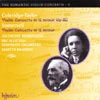Coleridge-Taylor; Somervell Violin Concertos
Crusading Hyperion unearth forgotten concertos that are wholly enchanting
View record and artist detailsRecord and Artist Details
Composer or Director: Arthur Somervell, Samuel Coleridge-Taylor
Label: Hyperion
Magazine Review Date: 3/2005
Media Format: CD or Download
Media Runtime: 65
Mastering:
Stereo
DDD
Catalogue Number: CDA67420

Tracks:
| Composition | Artist Credit |
|---|---|
| Concerto for Violin and Orchestra |
Samuel Coleridge-Taylor, Composer
Anthony Marwood, Violin BBC Scottish Symphony Orchestra Martyn Brabbins, Conductor Samuel Coleridge-Taylor, Composer |
Author: Jeremy Nicholas
This fifth volume in Hyperion’s Romantic Violin Concerto series – already a distinctive and valuable adornment to the catalogue – sits well with those that precede it: the works may not be of the front rank, but the performances are persuasive enough to convince you that they might be, and merit a place in the regular repertoire. Would that Hyperion’s crusading spirit were reflected by concert programmers.
Coleridge-Taylor’s concerto was the composer’s last major work and dedicated to the American Maud Powell (she gave its first performance in 1912). It opens with a large-scale sonata movement, thematically the weakest of the three and relying on rhetorical gestures and workaday ideas. By contrast, the slow movement is one of the most lyrically beautiful of its kind, heralded by writing that hints at Ravel – or rather Ravel as distilled by the George Melachrino Strings – and presages the gorgeous slow movement of the Korngold Concerto. Towards its close, the catchy rondo finale makes reference to both movements.
Arthur Somervell, best remembered for his setting of Housman’s A Shropshire Lad, wrote his concerto (like Coleridge Taylor’s, in G major) in 1930 for Adila Fachira, the sister of violinist Jelly d’Aranyi (both grand-nieces of Joachim). This is its first recording. Though, as Lewis Foreman’s excellent booklet-notes observe, Somervell was ‘a product of a German musical aesthetic’, the concerto is unmistakably English. Already, I am hugely fond of it, with its Elgarian-pastoral first movement (the second subject reminiscent of Borowski’s once-famous violin piece Adoration), its central Adagio which rivals Coleridge-Taylor’s in its expressive vision, and the heart-warming, open air bucolic dance of the rondo finale.
If Andrew Marwood, Martyn Brabbins and the Scottish players learnt the works specially for this recording, then they’ve utterly fooled me. Totally at one with the idiom, Marwood’s unflashy, sweet-toned playing lends just the right note of enchantment and authenticity to these forgotten scores. In short, this is Hyperion at its best.
Coleridge-Taylor’s concerto was the composer’s last major work and dedicated to the American Maud Powell (she gave its first performance in 1912). It opens with a large-scale sonata movement, thematically the weakest of the three and relying on rhetorical gestures and workaday ideas. By contrast, the slow movement is one of the most lyrically beautiful of its kind, heralded by writing that hints at Ravel – or rather Ravel as distilled by the George Melachrino Strings – and presages the gorgeous slow movement of the Korngold Concerto. Towards its close, the catchy rondo finale makes reference to both movements.
Arthur Somervell, best remembered for his setting of Housman’s A Shropshire Lad, wrote his concerto (like Coleridge Taylor’s, in G major) in 1930 for Adila Fachira, the sister of violinist Jelly d’Aranyi (both grand-nieces of Joachim). This is its first recording. Though, as Lewis Foreman’s excellent booklet-notes observe, Somervell was ‘a product of a German musical aesthetic’, the concerto is unmistakably English. Already, I am hugely fond of it, with its Elgarian-pastoral first movement (the second subject reminiscent of Borowski’s once-famous violin piece Adoration), its central Adagio which rivals Coleridge-Taylor’s in its expressive vision, and the heart-warming, open air bucolic dance of the rondo finale.
If Andrew Marwood, Martyn Brabbins and the Scottish players learnt the works specially for this recording, then they’ve utterly fooled me. Totally at one with the idiom, Marwood’s unflashy, sweet-toned playing lends just the right note of enchantment and authenticity to these forgotten scores. In short, this is Hyperion at its best.
Explore the world’s largest classical music catalogue on Apple Music Classical.
Included with an Apple Music subscription. Download now.

Gramophone Digital Club
- Digital Edition
- Digital Archive
- Reviews Database
- Events & Offers
From £9.20 / month
Subscribe
Gramophone Club
- Print Edition
- Digital Edition
- Digital Archive
- Reviews Database
- Events & Offers
From £11.45 / month
Subscribe
If you are a library, university or other organisation that would be interested in an institutional subscription to Gramophone please click here for further information.






